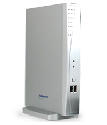Why thin clients enhance data security
Aug 18, 2006 — by LinuxDevices Staff — from the LinuxDevices Archive — 1 views Neoware, a vendor of Linux-powered thin clients, recently published a whitepaper making the case that server-based thin client computing “can dramatically improve data security at the desktop,” compared to the use of standard PCs in a networked environment.
Neoware, a vendor of Linux-powered thin clients, recently published a whitepaper making the case that server-based thin client computing “can dramatically improve data security at the desktop,” compared to the use of standard PCs in a networked environment.
Recent high-profile incidents of compromised confidential data reveal the extent of the security problem, Neoware says. In response, many organizations are adopting more stringent policies regarding the use of portable and mobile devices, as described in a recent article at The Wall Street Journal online.
According to Neoware, server-based computing is inherently more secure than desktop PCs because the data and application software reside on a central server rather than on the user's PC. Centralized servers can more easily be managed by corporate IT staff; additionally, all external connections such as email and the Internet pass through one location.
Thin clients are relatively immune to infection by viruses, worms, and trojans, Neoware claims. “Email, web browsers, and other productivity applications all have the ability to download, save, and execute malicious code,” explains Neoware VP of engineering Ed Parks. Specifically, Parks contends, email is the source of 95 percent of virus infections.
Thin clients avoid infection because data exists only in RAM, according to Parks. “Should a virus somehow get onto the desktop, it would exist only in memory. As soon as you turn off the device, the virus disappears. Turn it back on again, and your virus problem is over,” he says.
Neoware's thin client security whitepaper, “The Thin New Line,” is available as a free PDF download with registration. Click here to register for the download.
Two years ago, Neoware was named the eighth fastest growing company in the U.S. by Fortune Magazine.
This article was originally published on LinuxDevices.com and has been donated to the open source community by QuinStreet Inc. Please visit LinuxToday.com for up-to-date news and articles about Linux and open source.